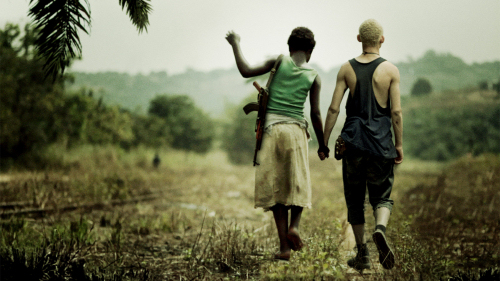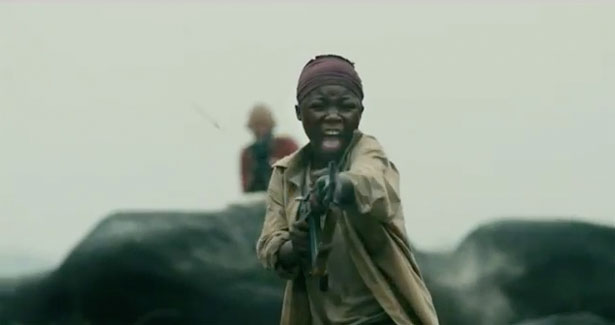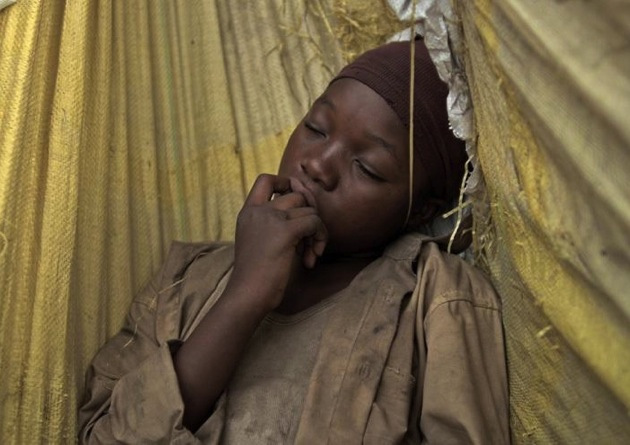So if something happens somewhere in Africa, and a white person is not there, do people hear it? well, according to Hollywood at least, no. There is an obsessive need in Western films to legitimize the African story and life through the existence of a major white character in the movie like The Last King of Scotland with James McAvoy or Blood Diamond with Leonardo DiCaprio, or even the The Constant Gardener with Rachel Weisz and Ralph Fiennes. These movies attempt to chronicle the horror of civil war or corruption that leads to major conflict in African nations. As the daughter of African immigrants who both lived their lives in a war torn country, I am grateful these stories are even being told but it’s a shame that the existence of attractive white movie stars is necessary to tell the story. Even more the reason, War Witch pleasantly surprised me. War Witch is a story from the perspective of one young African girl’s journey to reclaim her life in the face of war and sexual assault.
Primarily filmed in the Democratic Republic of Congo,
War Witch is a 2012 Canadian drama film written and directed by Kim Nguyen. According to Canadian news The Globe & the Mail, Nguyen himself part Vietnamese and French was inspired by a Burmese story he read about child soldiers. Nguyen’s inspiration became
War Witch. The story of a 12 year old Komona (Rachel Mwanza) who lives in a rural village in Africa when civil war in her country interrupts her childhood. Rebel forces invade her village, in a very painful scene, Komona’s induction into warfare is choosing between shooting her own parents (by the orders of the rebel commander) or watching them die a painful death at the hands of a machete. The scene is already heart wrenching but it becomes even more so when her parents say to her soothingly, “it’s okay” if she shoots them. After she kills them, she is taken from the only home she’s ever known to become one of rebel forces many child soldiers.
The film walks you through what life is life as a child soldier with rebel forces: waging guerilla warfare at any given moment, sleeping in the woods, eating rations. Komona adjusts to her new existence with a depressed and stunned silence. A fellow child soldier and albino boy named Magicien (Serge Kanyinda) befriends her and occasionally sneaks her food through their journey.
Aided by “magic milk” or a hallucinogen from a tree sap, that Magician finds for his fellow child soldiers to drink. Komona begins to see her parents and the ghosts of others killed by rebel forces who tell her how to avoid surprise attacks. She becomes so good at predicting surprise attacks she becomes the prized “war witch” to the rebel forces and particularly the “Great Tiger” the leader of the rebel forces played by (Mizinga Mwinga). In an interesting twist, on an attack gone awry one day, Magician convinces Komona to leave the rebel forces with him, confessing his love for her and desire to marry her.
What I love is despite what life has thrown at her Komona is a determined girl. While clearly drawn to Magicien, she refuses to marry him unless he can find a white rooster, which in her culture her father said, “when a man can find a white rooster, he can marry you”. Probably between her desperation to cling to family traditions, and to set some standards for herself she sends Magicien on what is a hilarious rooster chase (and a much needed lull from the horrors of war). Even though she finally consents, to marrying him without the white rooster (as he has become family to her while on the run), Magicien remains determined to find a white rooster, to prove he is worthy of her, which he does.

Afterwards, Komona and Magicien marry and they arrive at Magicien’s Uncle’s home. Magicien’s Uncle is called “Boucher” which is French for “butcher”. Boucher (Ralph Prosper) cuts meat for a living. It is learned the Boucher watched his entire family being butchered by a machete. Boucher’s trauma from watching his family cut to pieces is so strong he needs an empty pail next to him while he cuts animal meat, so he can vomit in pail due to the memories. This shared trauma bonds him and Magicien and Komona together like a family. And for a time, Komona is happy.
An abrupt turn of tragic events places Komona back in the hands of rebel forces and this time becomes the sex slave of the rebel commander. Komona is barely able to take it upon learning she’s pregnant as a result of continuous rape and exacts an excruciating painful revenge on her assaulter.
The rest of the movie focuses on her life post her second escape from the rebel forces. She returns to stay with Magicien’s Uncle, Boucher. Like Boucher she suffers from post-traumatic stress disorder. But they live in a world where rape is not even discussed (let along counseling services provided), and post-traumatic stress disorder is even less understood, Komona wrestles emotionally for peace. She sees a priestess to atone for her murders of countless people including her parents. The ghosts of her parents still haunt her dreams and she has regular nightmares of being attacked. And on top of everything else, she grapples with the expected anger and horror of being pregnant by her rapist. This is a lot to deal with for a woman of any age let along a young girl like Komona.
Why do I love this movie? It is a Western film of a civil war in an African nation told through the eyes of not just the Africans living through it, but through an African girl living the trauma and grappling with resolution for herself. Director Kim Nguyen came up against challenges in the film industry because of this take. In an interview with The Hollywood Reporter, Nguyen said: “I had brutal answers that would tell me a Black main actor doesn’t sell.” This makes it even more outstanding that War Witch not only swept, Jutra, the Quebec film awards but was a contender for the Golden Bear (equivalent of Best Film) at the 62nd Berlin International Film Festival in February 2012. For her work, Rachel Mwanza won the Silver Bear for Best Actress at the Berlin festival and Best Actress at the 2012 Tribeca Film Festival. War Witch also received the much coveted Academy Award nomination for Best Foreign Film of 2012.
It is amazing that for such an award-winning film, War Witch is not legitimized through the presence of a white European spectator (like in all the previously aforementioned Western films) who observes the tragedy and participates in what can only be called self-flagellation about why they can’t be a better “Great White Hope” for the poor Africans.
Another reason I love this movie? The men in Komona’s life do no legitimize her either. It is Komona’s journey alone, on her own defined terms, to redefine her life when for so long it was defined by her captors and everyone around her. It is also her journey to womanhood. It is interesting how Komona reaches some peace finally at the end of the movie, but the viewer is secure in knowing that it is her resolution and no one else’s.
———-
Atima Omara-Alwala is a political strategist and activist of 10 years who has served as staff on 8 federal and local political campaigns and other progressive causes. Atima’s work has had a particular focus on women’s political empowerment & leadership, reproductive justice, health care, communities of color and how gender and race is reflected in pop culture. Her writings on the topics have also been featured at Ms. Magazine, Women’s Enews, and RH Reality Check.




